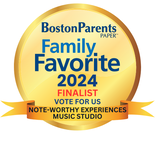About UsNote-worthy Experiences Music Studio LLC, located at 75 Witherell Drive Sudbury, Massachusetts 01776 provides private in-home and online/virtual music lessons in the Boston MetroWest area of Massachusetts.
We also provide private lessons at Nashoba Brooks School. Contact Renee Bordner at 978.443.0480 or rbordner@note-worthyexperiences.com. Not a member of our studio yet? Join our mailing list to receive news and updates! All Copyrights Reserved (c) 2015-2024
|
What Our Students Are SayingOur Privacy Policy |

 RSS Feed
RSS Feed
